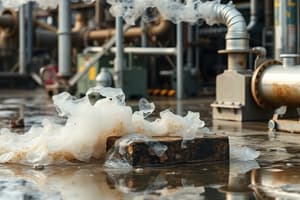Podcast
Questions and Answers
What is water pollution primarily caused by?
What is water pollution primarily caused by?
- Normal aquatic life activities
- Excessive rainfall
- Chemical contamination from various sources (correct)
- Natural sedimentation processes
Which of the following is a source of wastewater?
Which of the following is a source of wastewater?
- Drinking water distribution
- Rainwater collection
- Agricultural runoff (correct)
- Groundwater recharge
What major factor contributes to oil pollution in oceans?
What major factor contributes to oil pollution in oceans?
- Transportation emissions
- Natural oil seeps
- Consumer vehicle usage (correct)
- Industrial oil drilling
What is the effect of improper waste disposal on soil?
What is the effect of improper waste disposal on soil?
Which chemical is primarily responsible for ozone depletion?
Which chemical is primarily responsible for ozone depletion?
What are the consequences of acid rain?
What are the consequences of acid rain?
What is a significant contributor to soil pollution from agricultural practices?
What is a significant contributor to soil pollution from agricultural practices?
Which greenhouse gas is primarily associated with global warming?
Which greenhouse gas is primarily associated with global warming?
What does environmental chemistry primarily study?
What does environmental chemistry primarily study?
Which component of the environment does the lithosphere refer to?
Which component of the environment does the lithosphere refer to?
What is a significant effect of the pollutants released from burning fossil fuels?
What is a significant effect of the pollutants released from burning fossil fuels?
Which of the following is NOT a source of air pollution?
Which of the following is NOT a source of air pollution?
What chemical is primarily emitted during agricultural activities that poses environmental hazards?
What chemical is primarily emitted during agricultural activities that poses environmental hazards?
What is NOT included in the biosphere according to the content?
What is NOT included in the biosphere according to the content?
Which of the following best describes the role of chemicals in the atmosphere?
Which of the following best describes the role of chemicals in the atmosphere?
What type of pollution includes the contamination of soil with heavy metals?
What type of pollution includes the contamination of soil with heavy metals?
Study Notes
Environmental Chemistry
- Environmental chemistry studies chemical reactions, sources, transport, effects, and fates of chemical species in soil, water, and air.
Environmental Components
- Atmosphere: The gaseous layer surrounding Earth; studies focus on air pollution, greenhouse gases, and climate change.
- Hydrosphere: All water bodies (oceans, rivers, lakes, groundwater); studies involve water pollution and its sources.
- Lithosphere: Earth's crust and soil; studies include soil contamination, nutrient cycling, and heavy metal pollution.
- Biosphere: All living organisms; studies focus on bioaccumulation, toxicity, and ecosystem health.
Types of Environmental Pollution
- Air pollution
- Water pollution
- Soil pollution
Air Pollution
- Causes: Burning fossil fuels (releasing CO, CO2, NOx, SO2), burning forests (similar pollutants to fossil fuels), automobiles (greenhouse gases and pollutants), agricultural activities (ammonia and other harmful chemicals).
- Effects: Global warming due to greenhouse gas emissions, respiratory illnesses, and other health problems.
Water Pollution
- Causes: Sewage and wastewater (containing various pollutants), oil spills (large and small), industrial discharge, agricultural runoff (fertilizers and pesticides).
- Effects: Degradation of water quality, harm to aquatic life, and risks to human health.
Soil Pollution
- Causes: Pesticides, improper waste disposal, mining activities, industrial spills.
- Effects: Harm to soil organisms, reduced plant growth, and contamination of groundwater.
Chemical Reactions and Environmental Impacts
- Ozone Depletion: Chlorofluorocarbons (CFCs) react with ozone in the stratosphere, depleting the ozone layer and increasing UV radiation exposure.
- Acid Rain: Sulfur dioxide and nitrogen oxides react with water to form acids, damaging the environment.
- Greenhouse Effect: Greenhouse gases (CO2, methane, nitrous oxide) trap heat, leading to global warming and climate change.
Studying That Suits You
Use AI to generate personalized quizzes and flashcards to suit your learning preferences.
Related Documents
Description
Explore the fundamentals of Environmental Chemistry, which encompasses the study of chemical reactions and their effects on various environmental components such as air, water, and soil. This quiz covers essential topics including types of pollution and the impact of human activities on the environment.




